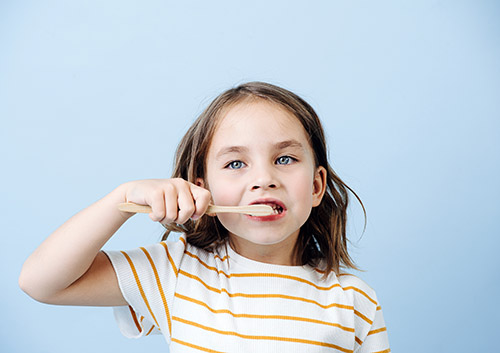Clean Toothbrush/Healthy Toothbrush
October 19th, 2022

We’ve all learned a lot about staying healthy lately. As a parent, you give good advice about avoiding germs in public places, cleaning things that get touched a lot like phones and keyboards, and learning the best way to wash hands. These small daily habits can have a big effect on your child’s health.
And since you’re already taking care of your little one by making sure they brush at least twice a day, we have some good advice for small habits which can make their toothbrush even cleaner and brushing even healthier.
Brushing Habits
Don’t let germs hitch a ride on your child’s toothbrush before they even begin brushing! Make sure their hands are clean before they start, and rinse off the toothbrush before they put it in their mouth.
After brushing, be sure your child rinses their brush carefully to get rid of leftover toothpaste and bits of food. Also, clean the toothbrush holder regularly to get rid of germs and bacteria.
And while we’re talking about germs, how about . . .
- Flushing Habits
Most toothbrushes live in the bathroom, where we also find—the toilet. Every time we flush, invisible bacteria and particles fly through the air. And while that might not make you sick, it’s still pretty gross. Closing the lid before you flush helps keep your family’s toothbrushes—and bathroom—cleaner.
- Airing? Yes!
Keeping a toothbrush in a dark, wet environment is the perfect way to help bacteria grow. Instead of putting a wet toothbrush in a case, let it air dry standing heads up after use. Give it a shake first for a head start on drying out.
- Sharing? No
We’re not talking about sharing a brush, which you would never do. We’re talking about sharing space. If your child’s brush touches other brushes in a toothbrush holder, it’s probably sharing germs. Toothbrushes shouldn’t be too close to other toothbrushes, no matter how close you are to the other brush’s owner!
Finally, no matter how well your child takes care of their toothbrush, there comes a time when you should let it go. After three or four months, bristles become frayed and worn out. This means the brush won’t remove plaque as well as it used to. And to be on the safe side, it’s a good idea to replace a brush if your child has been sick.
Keeping your child’s teeth and mouth healthy is one very important way to keep their whole body heathy and happy. Talk to Drs. Rottschalk, Acker, and Froidcoeur at our Fairview Heights, IL office to learn more about simple habits for healthy teeth!
Does flossing hurt your gums?
October 12th, 2022

Ideally, it should never hurt when you floss your teeth. But if you haven’t flossed in a long while or don’t do it regularly, you may experience sore or bleeding gums. You should floss every day to avoid pain and maintain the best oral hygiene. In the meantime, there are a few things you can do to make flossing a little more pleasant.
Be Gentle
If your gums are sensitive, take your time and be gentle while flossing. Rough flossing can lead to more irritation and soreness. Also, daily flossing should help your gums become acclimated to the practice, and as a result, irritation should decrease over time.
Use an Alternative Method
If you still feel discomfort after being gentle, an alternative method of flossing may work better for you. A water floss machine or Waterpik can dislodge food particles and plaque without irritating your gums. Also, some brands of floss have a soft coating that make them less harsh and harmful to your gums.
Many people tend to forget or skip flossing, but it is one of the most important steps your dental hygiene routine and shouldn’t be neglected. If you are consistent about flossing, your gums should become used to it and won’t be so irritated in time.
For more flossing tips, schedule an appointment at our Fairview Heights, IL office and ask Drs. Rottschalk, Acker, and Froidcoeur or a member of our team!
When Is a “Cavity” Not a Cavity?
October 5th, 2022

Is this a trick question? After all, you probably already know quite a lot about cavities:
- It all begins when bacteria-filled plaque sticks to teeth and starts to attack enamel. How?
- Because the bacteria in plaque use the sugars and other foods we eat to produce acids.
- These acids gradually weaken teeth by dissolving minerals which help make up our enamel (a process called demineralization).
- Over time, a hole, or cavity, develops in the tooth surface.
- Left untreated, bacterial decay can spread to the inside of the tooth, creating a more serious cavity.
Some cavities aren’t discovered until you visit our Fairview Heights, IL office, but sometimes there are clear signs that there’s a problem.
- You have tooth pain or sensitivity.
- Your tooth changes color in spots where the enamel has decayed.
- You might even notice enamel loss when a cavity is large enough.
So, if you have any of these symptoms, it’s a cavity, right? It might be—but it might not. Sometimes, because the symptoms are similar, what we suspect is a cavity is really enamel erosion.
The bacteria-created acids weaken enamel. But it’s not just bacteria that subject our teeth to acids—we do it ourselves with our choice of food and drink. Acidic foods are one of the leading causes of tooth erosion.
Our normal saliva pH level is around a 7, which is neutral. Any number lower is acidic; any number higher is alkaline. Acidic foods have a low pH (the pH of lemon juice, for example, measures between 2 and 3), and can reduce our normal, neutral pH level. When saliva pH levels drop to 5.5 or lower, tooth enamel starts to demineralize, just as it does when exposed to the acids from oral bacteria.
Regularly snacking on citrus and other acidic fruits, wine, fruit juices, flavored teas, sour candies, and other acidic foods can cause enamel erosion. Especially erosive are sports drinks, energy drinks, and colas, because they contain some combination of citric acid, phosphoric acid and/or carbonation.
The symptoms of tooth erosion and damaged enamel can be very similar to those caused by cavities:
- You suffer tooth pain or sensitivity
- Your teeth appear discolored, as the enamel thins to reveal the yellowish dentin underneath
- You notice missing enamel—your teeth become rounded or have little pits known as cupping
You call Drs. Rottschalk, Acker, and Froidcoeur right away if you suspect a cavity. Be just as proactive if you suspect erosion. Even though your symptoms may not have been caused by plaque and bacteria, acidic erosion from your diet leaves weakened enamel just as vulnerable to cavities and decay.
How to avoid erosion?
- Enjoy acidic foods sparingly, or as part of a meal. This helps your saliva pH stay in the neutral zone.
- Balance acidic foods with low-acid choices to help neutralize acids and restore a normal pH balance. (A good reason to pair wine or fruits with cheese.)
- Use a straw! This simple solution keeps erosive drinks from bathing your teeth in acids.
- Drink water instead of an acidic beverage, or drink it afterward to rinse your mouth. The pH of pure water? A perfect, neutral 7.
- And what about brushing right after eating or drinking something acidic? Ask Drs. Rottschalk, Acker, and Froidcoeur if you should rush for your brush. We may recommend waiting 30 minutes or so after an acidic treat to give teeth time to remineralize after acids weaken them. Otherwise, brushing might cause more wear and tear on your enamel.
- Finally, while foods are often the source of acid erosion, medical conditions can cause erosion as well. Talk to us about ways to minimize erosion while addressing your medical needs.
There’s no trick to it—watching your diet, brushing and flossing as recommended, using a fluoride toothpaste, and visiting Dr. John Rottschalk Dental Group for regular checkups will help prevent tooth erosion. We can restore eroded enamel with bonding, veneers, or crowns if the erosion is serious. Better still is to catch erosion before symptoms appear to keep your teeth their strongest for a lifetime of healthy, beautiful smiles.
Dry Mouth and How to Treat It
September 28th, 2022

In fancy medical terms, dry mouth is known as xerostomia. It’s really just what it sounds like: a condition in which you don’t have enough saliva to keep your mouth moist. Dry mouth can be the result of certain medications you’re taking, aging, tobacco use, nerve damage, or chemotherapy.
Depending on whether you’re aware of the cause of your dry mouth, here are some simple ways to keep it at bay:
- Avoid drinks that contain alcohol or caffeine
- Avoid tobacco use, or lower your consumption of tobacco
- Floss after every meal
- Brush your teeth after every meal using a fluoride toothpaste
- Avoid foods that have a high level of salt
- Stay hydrated and drink water frequently
- Consider using a humidifier at night
If you have any questions about dry mouth and how it is affecting you, give our Fairview Heights, IL office a call or make sure to ask Drs. Rottschalk, Acker, and Froidcoeur during your next visit!





